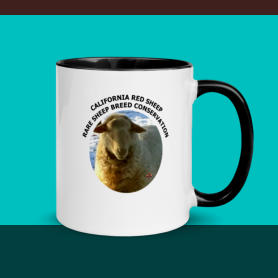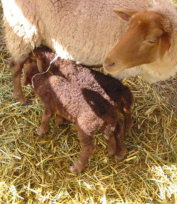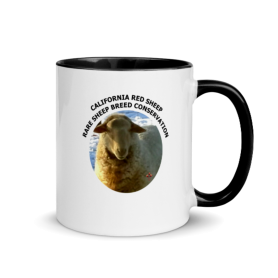
California Red Sheep History
The origin of the California Red Sheep breed traces to a back yard project of Dr. Glenn Spurlock of the University of California. Around 1970, Dr. Spurlock hoped to construct a larger meat breed by crossing Tunis with what was, at that time, called Barbado Sheep. There was not an established registry for the Barbado Sheep until 1996 and the separation of horned and polled genetics did not begin until 2004. Therefore, the exact genetic makeup of the Barbado Sheep used in Dr. Spurlock’s experiment is not known. Crossbreds developed from this experiment proved to be remarkable hybrids with resistance to many of the problems that plagued sheep ranchers. However, they were far from Dr. Spurlock’s goal of larger wool free meat sheep. Ultimately, Dr. Spurlock abandoned his project, but not before handing it over to Glen and JoAnne Tomlinson. In 1975, Aime and Paulette Soulier of Winters, California purchased some of the project animals and began improving the original cross with Dr. Spurlock’s advice to infuse more Tunis blood. They were later joined by Tom Bair and Alice Gardner and others. Although the first crossbreds came in both the Barbado coloration (often referred to as badgerface) and the red hues more typical of the Tunis breed, somewhere along the line, the originators of the breed decided that they preferred the red hues and in due course the badgerfaces were excluded and the California Red Sheep was born. In 1985, the California Red Sheep Registry was established. From 1985 to 2020 there have been over 2800 animals registered. Breeders are now spread from coast-to-coast in the US and have established a presence in Canada.

© 2021 Shear Perfection Ranch and/or circleofdreamers.com





Rare Breed Conservation and New Breed Development
California Red Sheep
History
The origin of the California Red Sheep breed traces to a back yard project of Dr. Glenn Spurlock of the University of California. Around 1970, Dr. Spurlock hoped to construct a larger meat breed by crossing Tunis with what was, at that time, called Barbado Sheep. There was not an established registry for the Barbado Sheep until 1996 and the separation of horned and polled genetics did not begin until 2004. Therefore, the exact genetic makeup of the Barbado Sheep used in Dr. Spurlock’s experiment is not known. Crossbreds developed from this experiment proved to be remarkable hybrids with resistance to many of the problems that plagued sheep ranchers. However, they were far from Dr. Spurlock’s goal of larger wool free meat sheep. Ultimately, Dr. Spurlock abandoned his project, but not before handing it over to Glen and JoAnne Tomlinson. In 1975, Aime and Paulette Soulier of Winters, California purchased some of the project animals and began improving the original cross with Dr. Spurlock’s advice to infuse more Tunis blood. They were later joined by Tom Bair and Alice Gardner and others. Although the first crossbreds came in both the Barbado coloration (often referred to as badgerface) and the red hues more typical of the Tunis breed, somewhere along the line, the originators of the breed decided that they preferred the red hues and in due course the badgerfaces were excluded and the California Red Sheep was born. In 1985, the California Red Sheep Registry was established. From 1985 to 2020 there have been over 2800 animals registered. Breeders are now spread from coast-to-coast in the US and have established a presence in Canada.

© 2021 Shear Perfection Ranch and/or circleofdreamers.com






























